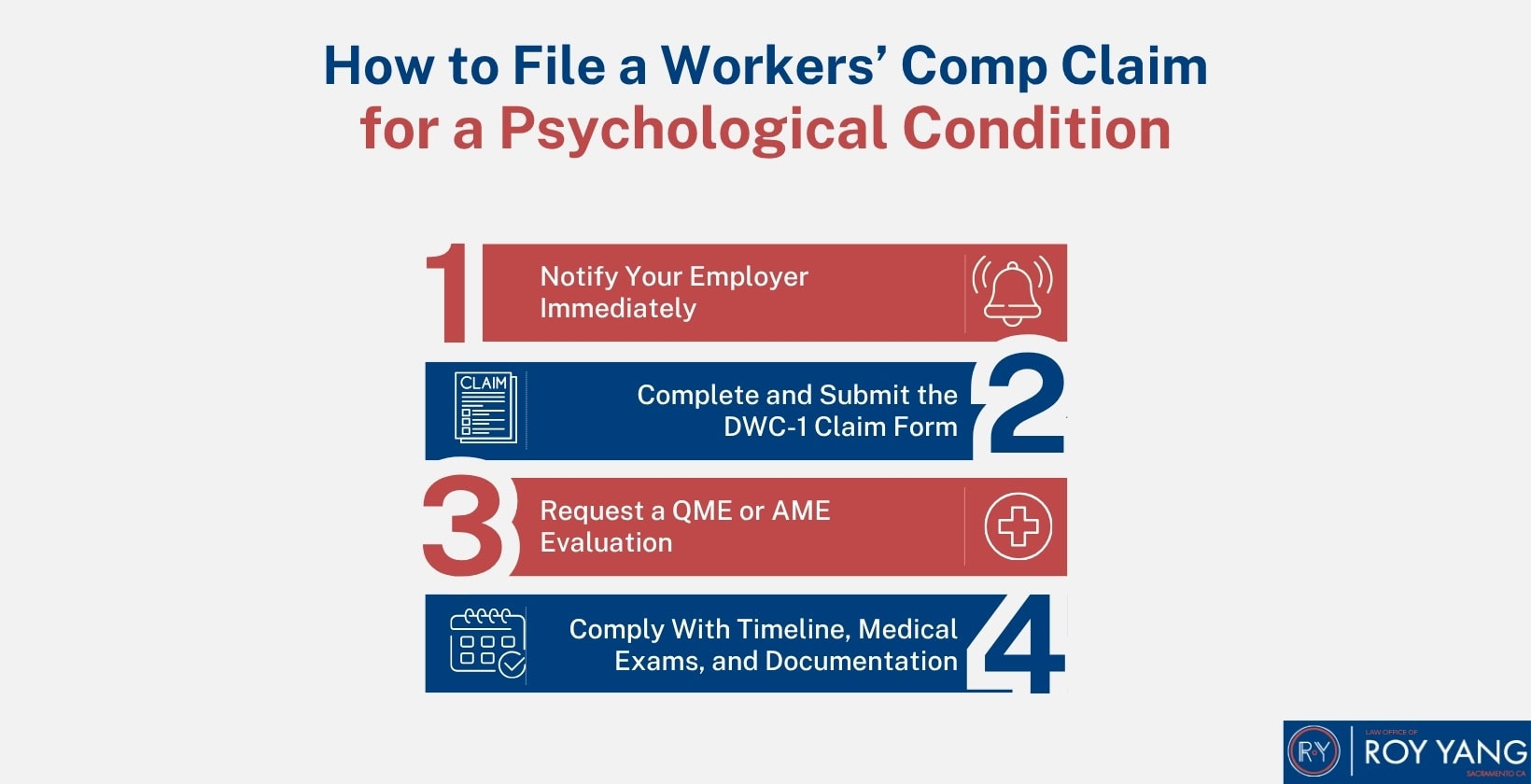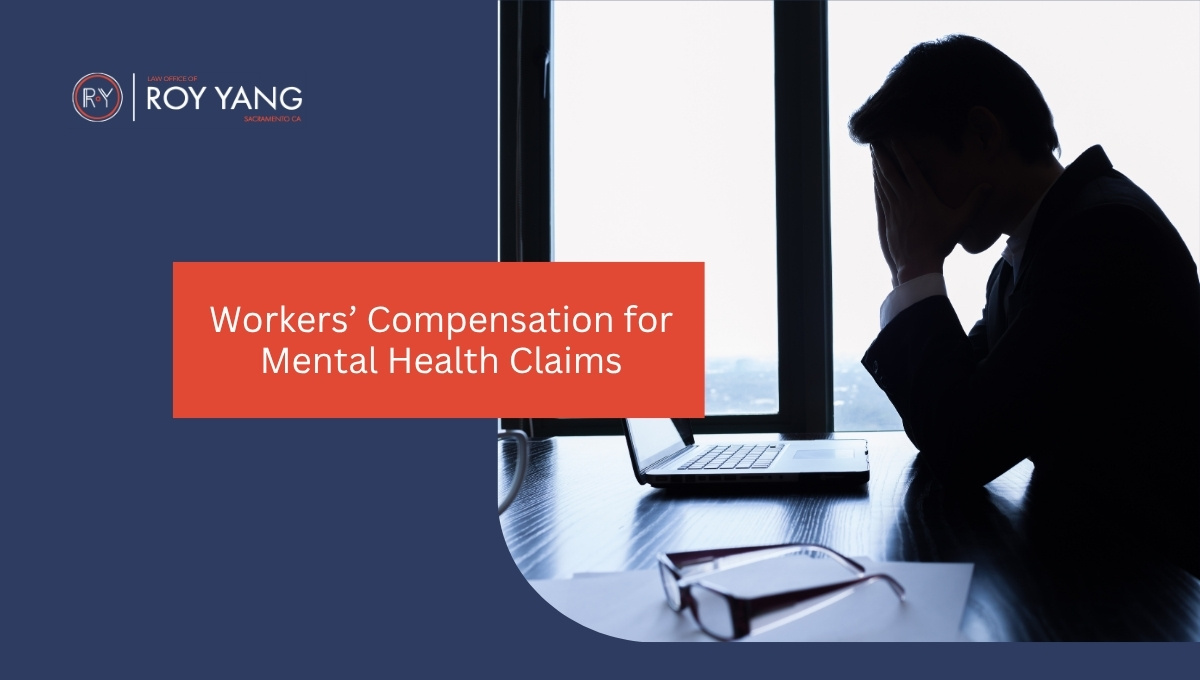While California workers’ compensation has traditionally focused on physical injuries, there’s growing legal recognition of how job-related mental health conditions can cause serious harm. Today, 34 U.S. states, including California, offer some form of mental health workers’ comp, with California providing one of the most detailed legal frameworks.
If you’ve experienced severe psychological issues such as stress, anxiety, depression, PTSD, or other diagnosed psychiatric conditions due to your job, you might question, “Can you get workers’ compensation for mental health?”
The answer is yes. It is possible to get workers’ compensation for mental illness. California Labor Code §3208.3 provides the legal basis for workers to file claims for psychological injuries, though there are important qualifications.
As California workers’ comp attorneys, we have encountered many clients unaware that work-induced mental health struggles are just as compensable as physical injuries. Whether it stems from a violent incident, extreme stress, chronic overwork, or witnessing trauma on the job, the law allows you to seek workers’ comp benefits. However, the process involves more than simply sharing your story; it ultimately depends on your eligibility, mental health status, and supporting evidence.
We’ll further explore them in the sections below:
Who Is Eligible for a Mental Health Workers’ Compensation Claim in California?
Eligibility for mental health workers’ comp claims in California depends on specific legal and medical requirements. While mental health-related claims are valid under state law, workers must meet certain conditions related to diagnosis, cause, employment status, and how the injury occurred. Not all mental struggles at work will qualify, and the law sets a clear standard for what counts as a psychological injury in workers’ compensation.
The following workers may qualify based on current California law and relevant legal thresholds:
Workers With a Job-Related Mental Health Diagnosis
Employees may be eligible who have a clinically diagnosed mental condition caused by actual events of employment may qualify for psychological workers’ comp. Common diagnoses include anxiety disorders, depression, PTSD, or adjustment disorders, but the diagnosis alone is not enough. The condition must impair your ability to function and must be strictly and directly related to your job.
Symptoms caused by personal stress, family issues, or unrelated psychological/mental problems are not compensable unless work is the primary cause.
Workers Meeting Labor Code §3208.3 Requirements
Under Labor Code §3208.3, a psychiatric injury is compensable if it is predominantly caused (over 51%) by actual work events. The law mandates that the diagnosis must be listed in the Diagnostic and Statistical Manual of Mental Disorders (DSM-5) and supported by a licensed psychologist or psychiatrist. This statute is significantly stricter than for physical injuries and sets both the medical requirements and the legal burden of proof.
Employees With at Least Six Months of Service
In most cases, an employee generally must be employed for at least 6 months to file a psychological injury claim. However, this requirement doesn’t apply if the injury resulted from a sudden and traumatic employment event or a violent act.
This six-month rule is designed to filter out claims for mental health-related injuries that are not the predominant result of work-related conditions.
Part-Time and Undocumented Workers With Legal Employment
Part-time, seasonal, and undocumented employees may be eligible for work-related mental health workers’ comp, provided they are legally recognized as employees. California workers’ compensation laws prioritize the employment relationship, not an individual’s immigration status or the number of hours worked, as long as they are not legally classified as independent contractors.
First Responders Covered Under SB 542 PTSD Presumption
Under Senate Bill 542, California law provides a PTSD presumption for certain public safety workers, including police officers, firefighters, and paramedics. This means that if a first responder is diagnosed with PTSD, the law automatically presumes their work caused it, unless the employer can prove otherwise. This shift in the burden of proof dramatically increases approval rates for first responder PTSD-related claims.
Workers Disqualified Due to Legitimate Personnel Actions
Mental issues caused solely by lawful employer actions, such as termination, demotion, discipline, or performance evaluations, are excluded under Labor Code §3208.3(h). This is one of the most common reasons for denial. If you were fired, written up, or transferred, and your claim is based only on that, your case may be disqualified, even when your emotional distress is real.
Which Mental Health Conditions Qualify for Workers’ Compensation in California?
In California, workers’ compensation may cover a range of mental health conditions if they are medically diagnosed and clinically proven to be a predominant result of actual workplace events.
Commonly qualifying mental health conditions and disorders include:
Covered Psychiatric Conditions: PTSD, Depression, Anxiety
The most commonly approved conditions for psychological injury workers’ comp include:
- Post-Traumatic Stress Disorder (PTSD)
- Major Depressive Disorder
- Generalized Anxiety Disorder
- Adjustment Disorder
Whether your symptoms stem from chronic work pressure, a traumatic incident, or Cumulative mental stress injuries, these mental injuries may be covered, as long as the condition is not temporary or mild.
Conditions Must Meet DSM-5 Diagnostic Criteria
For a condition to qualify as a compensable mental injury, it must meet the diagnostic criteria outlined in the latest edition of the DSM-5. This ensures the mental state is clinically recognized and not based on fleeting or short-term emotions. A formal diagnosis from a qualified mental health professional is essential for medical evidence to prove the severity of the condition and differentiate it from normal stress.
Stress Without Physical Injury Can Qualify
A physical injury is not required to qualify for workers’ comp benefits, as California allows mental-only injury claims. For example, suppose an employee develops severe anxiety or panic attacks due to toxic management, unrealistic quotas, or a traumatic workplace event. In that case, they may be eligible for stress-related workers’ compensation, even if no event occurred to cause them physical harm.
Secondary Mental Health Injuries From Physical Trauma
California also acknowledges physical-mental claims, where a mental health condition develops after a serious physical injury or during its recovery. For example, a warehouse worker suffers a spinal injury in a forklift accident and later develops depression due to chronic pain and disability.
These secondary psychological injury claims are valid under California law, provided a documented link exists between the mental condition and the original job-related physical injury.
What Proof Do You Need for a Mental Health Workers’ Comp Claim?

To successfully pursue a claim for mental health, you generally need to provide substantial evidence from multiple sources. Evidence must demonstrate both the existence of a diagnosed mental health condition and its direct causation by specific work-related events or triggers.
Here’s a breakdown of the types of proof required:
Meeting the “Predominant Cause” Legal Standard
Workers’ comp claimants must prove that their situation meets the state’s specific legal requirements, such as:
- The Predominant Cause Test: In California, work must be 51% or more of the cause for the psychiatric injury.
- Exclusion of Lawful Employer Actions: Claims based solely on “good faith personnel actions” are not compensable.
- Non-Work Factors Must Not Be Primary: Personal stressors or pre-existing mental health conditions should not be the main cause of the current mental disorder.
- Minimum Employment Duration: Worker must have been employed for at least 6 continuous months before the injury developed.
Medical Records, Witnesses, Incident Reports
To substantiate your mental health claim, you must provide solid evidence showing how work caused your mental health condition. Examples of supporting documentation include:
- Medical Records: Such as therapy notes, psychiatric evaluations, and diagnoses based on the DSM-5.
- Witness Statements: From coworkers or supervisors who observed the stressful incidents or your responses to them.
- Incident Reports: Including workplace complaints, HR reports, or official investigations into traumatic events.
- Emails or Documents: Any communications that reveal abnormal stressors or toxic work environments.
QME or AME Psychiatric Evaluation Reports
In most cases, your claim will be evaluated by either a Qualified Medical Evaluator (QME) or an Agreed Medical Evaluator (AME). These professionals are certified by the state to assess whether your mental condition is work-induced and to what extent you’re impaired. The QME or AME report will heavily influence your disability rating, claim approval, and benefit amounts.
How to File a Workers’ Comp Claim for a Psychological Condition?
Filing a workers’ comp claim involving a mental health condition requires compliance with strict procedures and legal deadlines. Because these claims often face higher delay and denial risk than physical injury claims, correctly following each step is essential.
Here’s what the standard process looks like:
Step 1: Notify Your Employer Immediately
Inform your employer or supervisor about your situation as soon as you have a diagnosis and can clearly link it to work. Provide a written report that includes the dates, times, and causes of your injury. This notice must be given within 30 days, or your claim may be barred.
Step 2: Complete and Submit the DWC-1 Claim Form
Ask your employer for a DWC-1 form for mental health, or download it from the California Division of Workers’ Compensation. Fill it out completely and return it to your employer to start the official claim process.
Step 3: Request a QME or AME Evaluation
If the claim is delayed or disputed, you’ll need a Qualified Medical Evaluator (QME) or Agreed Medical Evaluator (AME) to assess whether your work or workplace induces your current mental condition. The evaluation plays a major role in claim approval and benefit eligibility.
Step 4: Comply With Timeline, Medical Exams, and Documentation
Meet all deadlines, attend scheduled exams, and submit requested documents. Many psychological injury claims are denied simply due to missed steps or incomplete records. Given the complexity and risk of denial, hiring an experienced attorney can significantly increase the chances of claim success.

What Is the Deadline to File a Mental Health Workers’ Comp Claim in California?
In California, there are 2 important deadlines for filing a workers’ compensation claim for a psychological condition: the 30-day notice to your employer and the 1-year statute of limitations. Missing these deadlines means permanent dismissal of your workers’ comp case, unless an exception applies.
Understanding these timelines is critical for protecting your rights to compensation.
Statute of Limitations Rules and Exceptions
Generally, claimants have one year from the date of injury or the date they first became aware of the work-related condition to file a claim. Very limited exceptions apply in rare cases, including:
- Delayed Discovery: Symptoms were not immediately apparent.
- Employer Concealment: The employer hid information about the claimant’s rights or coverage.
- Cumulative Stress: The injury resulted from stress that worsened over time.
Delayed Onset or Cumulative Mental Trauma Claims
Mental health conditions often develop gradually over time. Cumulative trauma claims cover situations where stress, anxiety, or depression worsen after prolonged exposure to stressful or traumatic workplace events.
Similarly, a delayed onset occurs when a mental health condition, such as PTSD, does not manifest until months or even years after the traumatic workplace event occurred. The deadline usually begins when you first recognize the injury and its connection to work.
What Happens If Your Mental Health Claim Is Denied?
Denials are common in mental health workers’ comp claims because of the strict proof requirements under California law. However, a denial does not negate your legal rights, and you can still challenge the decision.
Here’s what happens if an insurance carrier denies your workers’ comp:
Receive a Denial Letter Explaining the Reasons
You’ll receive a denial letter from the claims administrator. This formal notice explains the reasons for denial, such as insufficient medical evidence, a finding that the injury was not predominantly work-related, or exclusion based on lawful personnel actions.
Appeal the Denial Through a Legal Process
You can next file an appeal with the Workers’ Compensation Appeals Board (WCAB) by applying for adjudication of the claim. The workers’ compensation appeals process may involve hearings, submission of new medical evidence, or a request for a QME. Having an attorney at this stage to legally represent your case often helps reverse a denial.
How Senate Bill 542 Changed Mental Health Claims for First Responders?
California Senate Bill 542 (SB 542), enacted in 2019, created a rebuttable presumption that PTSD and other mental health conditions in first responders are work-related. Before the bill, first responders normally faced stricter standards requiring them to prove their condition was predominantly caused by job events.
SB 542 brought significant changes, notably:
- First responders no longer need to prove that their PTSD is work-related, unless the employer can prove otherwise.
- Burden of Proof shifted in favor of the worker, with employers and insurers responsible for disproving work causation.
This new presumption has substantially increased the approval rates for special cases involving a CA work comp psyche violent act, such as responding to shootings, assaults, or traumatic emergencies.
Why Mental Health Claims Are Harder to Win Than Physical Injuries?
Workers in California often find that mental health workers’ comp claims face more scrutiny and resistance than physical injury cases. Several challenges contribute to the difficulty in winning these claims, including:
- Higher Burden of Proof Than Physical Injuries: State law requires proof that work was over 51% of the condition. By contrast, physical injuries only require showing that work was a contributing factor.
- Greater Dispute Rates From Employers and Insurers: Employers and insurers frequently argue that the condition is pre-existing or personal, dispute the medical diagnosis or QME report, and minimize the seriousness to deny claims.
- Stigma and Fear Limiting Claim Filings: Because of the fear of being labeled “mentally unstable” or facing retaliation or career damage, many hesitate to file, even if evident.
These legal and social factors collectively prevent many workers from accessing the benefits they are entitled to, making mental health claims less frequent and straightforward than physical injury claims.
What Benefits Can You Get from a Mental Health Workers’ Comp Claim?
A successful mental health workers’ comp claim can provide more than medical treatment. Depending on the severity of the condition and how it affects your ability to work, benefits may include income replacement, therapy coverage, and even job retraining.
Here’s a more detailed breakdown covering key benefits workers’ comp covers in mental health-related claims:
| Benefit | What It Covers | Key Details |
|---|---|---|
| Temporary or Permanent Disability Payments | Wage replacement during recovery or compensation for lasting impairment |
|
| Therapy, Counseling, and Medication Coverage | Mental health treatment at no out-of-pocket cost |
|
| Vocational Rehabilitation (for Eligible Cases) | Job retraining and placement if you cannot return to your old job |
|
How Much Are Mental Health Workers’ Compensation Settlements Worth?
Estimating the exact value of a mental health claim settlement is challenging, as there’s no fixed formula, and specific injury facts determine the case value. Several factors influencing the compensation amount for mental claims include:
Settlement Amounts Based on Disability Rating and Treatment Costs
Your potential settlement value increases with a higher disability rating. The final award considers costs associated with therapy, medication, psychiatric care, or long-term counseling.
For example, a worker with mild depression requiring short-term therapy may receive less than a worker with severe PTSD needing lifelong treatment.
Compensation Calculated Using California’s Workers’ Comp Formula
Insurance companies calculate California workers’ compensation using a statutory formula to determine the final settlement amount for psychological injury claims based on factors such as,
- Disability percentage (from medical evaluation)
- Age of the worker
- Occupation and job duties before the injury
- Average weekly earnings before the condition
How a Workers’ Compensation Lawyer Can Help With Mental Health Claims?

Given the strict medical evidence requirements, legal compliance, and higher dispute and denial risks in psychological injury claims, the process is legally challenging to navigate on your own. A workers’ compensation lawyer specializing in workplace mental health-related claims can take over your case and perform the following tasks on your behalf:
- Ensure your claim meets Labor Code §3208.3 requirements
- Help gather strong medical and employment evidence
- File the claim within the deadline
- Represent you in disputes or appeals before the WCAB
- Reduce stress by handling communication with insurers and claims administrators
Victims, already coping with the emotional toll, can focus on recovery while effective legal advocacy builds winning claims.
FAQs About Mental Health Workers’ Compensation Claims
Can I get workers' compensation for workplace stress in CA?
Yes, you can get workers’ compensation for workplace stress in California, but it must be the predominant cause of your disability and meet specific legal criteria.
Does workers' comp cover mental stress?
Yes, workers’ compensation can cover mental stress if it is proven to be caused by work-related factors, such as excessive workload, harassment, workplace accidents, trauma, or unreasonable job demands. However, it is often difficult to prove, and the specific requirements can vary by state.
Can I file a claim if my mental health condition developed gradually?
Yes, you can file a workers’ comp claim for a mental health condition that develops gradually over time. This type of claim is called a cumulative trauma (CT) mental health claim. To be eligible, you must demonstrate that the condition resulted from long-term workplace stressors and that you filed the claim promptly after receiving a diagnosis.
How do mental health workers' comp settlements work?
Mental health workers’ comp settlements are calculated based on your disability rating, treatment needs, and California’s compensation formula. Settlements can include payment for disability, medical care, and, in some cases, vocational retraining.
Can I choose my own doctor after a remote work injury?
Yes, you can choose your own doctor, but with conditions. In California, you have the right to pre-designate a physician in writing before an injury. If you have not done so, your employer or their insurance carrier can direct your initial medical treatment.
Why does a psychiatric worker's comp claim get denied in CA?
A psychiatric worker’s compensation claim in California can be denied for several reasons, primarily if the injury is deemed to result from lawful, good-faith personnel actions, such as reprimands, performance reviews, or other disciplinary measures.
What is the average compensation payout for psychological injury?
The average compensation payout for psychological injury ranges from $50,000 to $500,000, depending on the severity of the condition, your ability to return to work, and the terms of your insurance policy.
Will filing a mental health claim affect my current job?
It depends. California law prohibits retaliation for filing a workers’ compensation stress leave claim, but some workers still fear stigma or career impact. Legal protections are in place if retaliation occurs.
How does employee mental health affect workers' compensation?
Employee mental health affects workers’ comp by allowing claims for work-related mental health problems. However, these claims require proving that the condition is directly related to the job through a formal diagnosis and supporting evidence.
Has anyone won a stress case on workers' compensation in California?
Yes, people have won stress-related workers’ compensation claims in California, particularly in cases involving trauma or workplace incidents. However, these claims are challenging to win and require strong medical evidence to prove that the stress was directly caused by specific job-related events.
What to Expect After Filing a Mental Health Workers’ Comp Claim in California?
It’s natural to feel uncertain about the next steps, whether you’re considering filing a mental health claim or have already faced denials. Beyond the ongoing mental distress, claimants often experience worsening symptoms, disputes over eligibility, and pressure from insurers.
If you’re going through any of these challenges, remember that you’re not alone. Getting professional help from an experienced California workers’ compensation attorney is the best way to understand your options and make informed decisions. Contact the Law Office of Roy Yang for expert legal representation.



